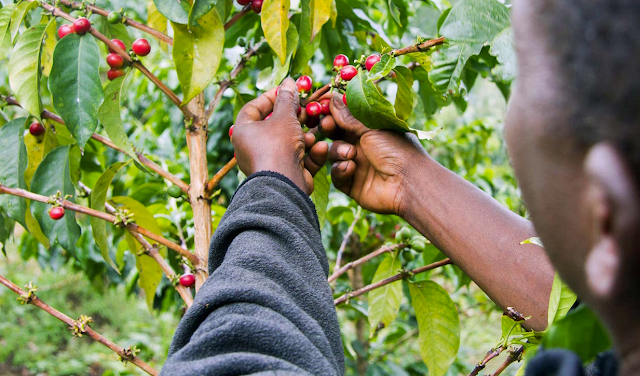Whispers in the Highlands: The Bittersweet Journey of Kenyan Coffee
In the soul of Kenya, where the earth breathes the whispers of ancient lands, coffee found its tortured passage—a journey marred with shackles and blood, traced not just through the soil, but upon the backs of those tethered to its fate. It wasn’t merely the transplantation of a crop; it was the forced migration of spirits, dreams stifled under the oppressive heat of relentless toil.
I can almost hear the low murmur of the Arab caravans, laden with the sacred beans, traversing closer to our highlands. Their path was stained with the suffering of my forebears, ensnared within the merciless grip of slavery, their lives a currency traded as freely as the beans they carried. The British followed—sailing on the promise of empire, they anchored their power deeply into our verdant green, painting the landscape with the dark hues of greed and control. They planted more than coffee in our soil; they sowed a legacy of blood and dominion.
As the 20th century dawned, the chill of British and European settlers seeped into the heart of our homeland. They grew rich on caffeine-soaked dreams, while my ancestors paid the true price—freedom, culture, and identity, ground up like the very beans that fueled the foreigners’ fortunes. With iron fists and cold hearts, they claimed our lands and barred the native Kikuyu, the true children of the soil, from nurturing the coffee bushes that flourished there. They levied hut taxes, squeezed the labor from tired limbs, and priced the very breath we drew.
Forced from lands bathed in our sweat and blood, many sought refuge and survival in the swelling cities. The echoes of their forced exodus reverberated through the decades until the shackles loosened, breaking only slightly before Kenya reclaimed her heartbeat in 1960. Yet, despite the torments tethered to its roots, the coffee thrived, blossoming into cups kissed with a sweetness born from the bitterest of trials—a testament to the resilience seeded within both land and people.
Today, Kenya’s Arabica, nurtured in the rich, volcanic cradles of our highlands, still carries the heritage of its painful past. It employs thousands, yet the irony bleeds through—those who tend it dwell in the shadows of poverty, their labor a cheap commodity against the global thirst for luxury. Even as new players like Ruiru 11 enter the stage, promising resilience against disease, they whisper fears of diluting the potent legacy our coffee carries, its robust notes of blackcurrant and its spirited acidity that dances like the fire of resistance in every sip.
Kenya's coffee saga is a symphony of contrast—rich yet poor, cherished yet exploited. Governed by a system that sings praise yet often falls short in its promises, each bean is a note in a broader, ongoing symphony of persistence, a hope steeped deep in the cups that the world holds so dear.
As the earth continues to turn and the coffee plants reach towards the sun, I stand deep in the soil of my ancestors, holding a bitter cup of history flavored with a sweetness no other land can claim. Here, amidst the lush green and the murky past, I sip on the legacy of those who came before me, each drop a remembrance, each sip a whisper of hope.
Tags
Coffee
